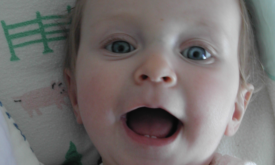I have two wonderful and rather intense children. Our days can often be quite lovely. Often there’s a lot of argument and obstinacy. But all in all, we make it through our days pretty well.
This is not how I would have described my family a few years ago. When my daughter hit the toddler stage, it was as if our family had been sucked into a hurricane. All the wisdom written about in parenting manuals and all the advice from highly experienced early childhood teachers just simply did not apply. Something seemed wrong.
It all came to a head when it became clear that school was not a place our daughter was going to thrive. In fact, it seemed to be a fight to the bitter end: either school would destroy her, or she would destroy the school.
All of this led us to the office of a well-regarded child psychiatrist, who, with very little attention paid to the little girl in front of her, started talking about “rapid onset bipolar disorder.” We left the office feeling like something was wrong. After some discussion and reading, we decided not to return.
I’d read enough about this so-called disorder to smell a skunk. Parents like us are desperate, yes. We find no help in traditional parenting techniques, certainly. Our lives are turned upside-down by one person, definitely. But to say that our brilliant, wonderful, creative daughter was mentally ill? This was a step we just couldn’t take. We didn’t go any further than that, and here we are today. Our days can actually be pleasant and sometimes even border on serene.
A lot of parents are taking that other route, but I don’t blame them. A well-respected professional tells them that their child has a mental disorder. Their lives have been sucked into a hurricane. There is even a drug the child can take! A return to normalcy is promised.
Problem is, it’s all based on misinformation and misunderstandings, and I’m not the person telling you this. It’s the person who wrote the book on mental disorders.
There is an excellent article in Wired Magazine this month about Allen Frances and his crusade against DSM-5, the upcoming update to what our nation’s psychiatrists define as mental illness. Though the article spans many topics having to do with DSM-5, the paragraph that caught my eye concerned Frances’ dismay over how the DSM-IV, of which he was lead editor, affected one particular mental illness that hadn’t even existed before:
Shortly after the book (DSM-IV) came out, doctors began to declare children bipolar even if they had never had a manic episode and were too young to have shown the pattern of mood change associated with the disease. Within a dozen years, bipolar diagnoses among children had increased 40-fold. Many of these kids were put on antipsychotic drugs, whose effects on the developing brain are poorly understood but which are known to cause obesity and diabetes.
The article goes on to point out that the most influential advocate for diagnosing bipolar in children had been paid by Johnson & Johnson, the maker of the drug used to treat it.
The Wired article is not online yet, but you can read Frances’ argument in Psychiatric Times. Reading this doesn’t make me feel smug; it makes me feel ill. I am so sad for all those families whose real problems were caught up in a fad. I am so sad for all those kids who are being left with lifelong health problems from the drugs they took. I’m especially sad that even if they choose to stop today, what’s been done to them cannot be undone.
Dealing with a difficult and unusual child is never easy. Perhaps the answer will involve drug treatment, though it doesn’t always. I’ve written before about the various steps we’ve taken, and how it has affected our lives both good and bad. The process has been infuriating, isolating, depressing, maddening. The route we chose to take was slow-moving and indefinite. But at every point on this slow-moving journey, we could have turned onto a new path. We could, and did, question the choices we were making. We made a choice to let our child be who she was, to work with what we had, and see if we could find a healthy path for her.
The drugs, we knew, would always be there if we chose to use them. But we could never look at drug therapy with the cavalier attitude of that psychiatrist, who seemed only to be thinking about pacifying the hurricane now, not how to work with it longterm.
I’m so glad that Allen Frances is sticking his neck out for all those other kids, whose parents didn’t feel they had a choice. And I hope that the people writing the new DSM-5 understand the awesome responsibility that comes with defining those parts of children’s behavior that are mental illness. I hope that they look down on the floor and really see that little girl they are fitting into their box.




One thought on “A problem of definition”
Comments are closed.